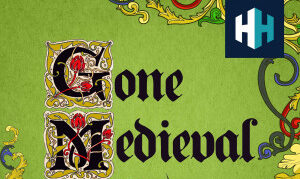Another academic year draws to a close: welcome, finally, to Week 8. The full Medieval Studies booklet is available here.
Next Thursday, 19 June, 4:30-6pm, is the official launch date for the “The Oxford Medieval Mystery Plays – the Film”. This is a wonderful chance to come together to celebrate the end of the year, and watch some of the excellent performances that were put on earlier in the term. At 4:45pm, the film will have its youtube premiere. You can tune in from anywhere in the world to comment; find the full schedule of when each play will start, more information, and a teaser here.
NB. If you are leaving us at the end of this year, and you would like to remain a member of this mailing list (and you are most welcome to do so), please register here with your personal email (link always available from our homepage https://medieval.ox.ac.uk/).
Monday
- Poetry, Power, Literacy, and the Emergence of Vernacular Literatures – 9am in the Radcliffe Humanities Building, Seminar Room. The workshop is part of the activities of the TORCH Network Poetry in the Medieval World.
- French Palaeography Manuscript Reading Group – 10:30 am in the Weston Library.
- Medieval History Seminar – 5pm at All Souls College. Stuart Airlie (Glasgow) will be speaking on ‘Returns of the Repressed: Aby Warburg’s cultural history of Percy Ernst Schramm’. Following the talk, a special drinks reception will be held to mark Julia’s retirement. Please sign up here.
Tuesday
- The Latin Palaeography Reading Group meets 2-3.30pm. Please email Laure Miolo for more information.
- Medieval Church and Culture – tea and biscuits from 5pm in the Wellbeloved Room, with talks from 5.15. Cassidy Serhienko (Pembroke) will be speaking on ‘‘That Fayre Lady’: women and the code of chivalry in late Arthurian romance’; Senia Magzumov (Worcester) will be speaking on ‘Imagining the Rus’ Pagan Past in the Radziwill Chronicle: a comparative study with the Litsevoi Letopisnyi Svod’.
Wednesday
- The Medieval German Graduate Seminar meets Wednesdays 11.15am–12.45pm in Oriel College, Harris Lecture Room. The topic for this term is the ‘Alexanderroman’ and this week Lucian Shepherd and Monty Powell will present. If you are interested to be added to the teams group for updates for future terms, please contact Henrike Lähnemann.
- Medieval Latin Document Reading Group – 4pm, online, please contact Michael Stansfield.
- Late Antique and Byzantine Seminar – 5pm in the Ioannou Centre. Special OCBR lecture – Marc Lauxtermann (Exeter) will be speaking on ‘The Emergence of Fiction: Byzantium and the East’.
- Oxford Centre of Islamic Studies Seminar – 5pm in the Oxford Centre of Islamic Studies. Dr Glaire Anderson (University of Edinburgh) will be speaking on ‘A Bridge to the Sky: Science and Arts in the Age of Ibn Firnas (d. 887)’.
- Medieval Women’s Writing Research Seminar – 5pm in the Lower Lecture Room, Lincoln College. The theme is ‘Letters of Friendship and Gratitude’.
Thursday
- The Oxford Medieval Mystery Plays: Film launch – 4:30pm at the Farmingdon Institute, Harris Manchester College.
- Lincoln Unlocked – 5.15pm in the Weston Library. Rebecca Menmuir will be speaking on ‘Achilles at Lincoln: Unlocking the Medieval Text of a Classical Poem’. Book here.
Friday
- Medievalists Coffee Morning – 10.30am at the Weston Library. All welcome, coffee and insight into special collections provided.
Opportunities (new additions in bold)
- British Academy talks on Anglo-Saxon and medieval Irish numismatics. More info here.
- The Latin Hymn as Scriptural Exegesis – from Late Antiquity to the Middle Ages – 25–26 September 2025. Registration is free but compulsory. Futher details here: https://classics.web.ox.ac.uk/event/the-latin-hymn-as-scriptural-exegesis-from-late-antiquity-to-the-middle-ages
- Essay Prize for Review of English Studies seeking applications – more information here.
- A number of roles are available at Hamburg’s ‘Understanding Written Artefacts’: Doctoral Researchers, post-docs, and advanced post-docs.
- London Medieval Society’s 80th anniversary colloquium on ‘Memory and Commemoration’ is being held at on Saturday 28th June at The Warburg Institute.
- ‘Big Data’ and Medieval Manuscripts Exploring the Potential of Large-Scale Catalogue Data – Thursday 26th June, 1–5pm, Weston Library. More information here.
- The Terence Barry Prize for Best Graduate Paper in Irish Medieval Studies – deadline May 30, 2025. More information here.
- Anglo-Israeli Archaeological Society Travel Grant – more info here.
- Call for Submissions: Taube Prizes for Student Writing in Hebrew & Jewish Studies – see blog post.
- National Archives Skills Courses – see blog post.
- CfP for ‘Staging Silence from Antiquity to the Renaissance’ – more information here.
- CfP for ‘Music and Reformation: A Symposium at Lambeth Palace Library, 16 September 2025’
- A regular pub trip is being organised on a Friday at 6pm at the Chequers, from 0th week to 8th week, for all medievalists at Oxford. Email maura.mckeon@bfriars.ox.ac.uk
- Additional spaces are available on the ‘Big Data’ and Medieval Manuscripts workshop – please sign up here.
- Registration for the Masterclass by Patrick Boucheron – Pourquoi des médiévistes ? Penser le contemporain depuis le Moyen Âge – 29 May, 2:30pm, Maison Française d’Oxford.
- Registration for Patrick Boucheron’s lecture entitled ‘The Birth of the Black Death: New Approaches in World History’ – 29 May, 5:00pm, Pembroke College.
- The Digital Medieval Studies Institute is hosting a set of workshops on digital scholarly methods specifically tailored for medievalists as part of the International Medieval Congress at the University of Leeds. More information can be found here.





